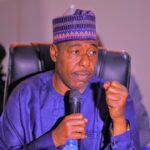
Environmental artist, Ifesinachi Comedy Nwanyanwu, has made a career of turning waste into beautiful art installations and sculptures that have been showcased in Nigeria and beyond. The sculptor, painter and executive director of Environmental Art Collective Foundation talks to Arts & Ideas about his art, philosophy and a new project, ‘One Environment,’ which he hopes will create greater awareness for environmental issues in Nigeria.
Ifesinachi Nwanyanwu reclined on the sofa, with the panache of royalty. The effect emboldened by the massive artwork that formed the backdrop for him, dominating the wall and setting the ambience. It is made from discarded straw the artist had gathered and woven into what it has become today, a centre-piece in his private gallery.
When Ifesinachi sees discarded things like straws, cans or bottle tops, he is excited because he doesn’t see them as waste but a medium of creating art. He is an environmental artist, one who delights in collecting refuse and turning them into art installations that have adorned many homes and galleries across the world.
“For me as an environmental artist, one of the key things I do is to use waste as material to create art, like this backdrop you see here, so that people can begin to have alternative views about waste. Someone’s waste is another’s treasure,” he said.
These words were a refrain he went back to again and again during the course of the interview. Ifesinachi is passionate about the work he does, and even more so with the materials he uses and these have led him to become the executive director of the Environmental Art Collective Foundation.
Around him, there are several colourful installations, some made of discarded Dangote sacks, others made of cans and some made from radio cassette tapes. Any kind of refuse has some artistic value for Ifesinachi, who grew up in the University town of Nsukka from where he recieved a degree in Crop Production, from the University of Nigeria. Leaving the greenery of Nsukka for the chaos and refuse heaps of Lagos, and then Abuja was the defining moment for him.
“Coming to the city, I have always felt the absence of the greenery. And being an artist I have always explored the materials I can work it and I think of what I can do with plastic bottles or this and that. And the more I do this, the more curious I become and I have been doing this for the last 16 years,” he said.
But the seed for the philosophy behind his art was planted much earlier. As a child he said he was taught that whenever he used the toilet, he should leave it better than he had found it. It was this lesson, coupled with his creativity that had driven him to explore waste as a medium for art.
“I had always been creative as a child but I always wanted to study medicine. But when I was in the University studying Crop Production, I started doing portraits for students and realized how much I could make from it. And people started asking what I was doing studying Crop Production. When I left [the university], I felt I didn’t have to look for an office job, because I was self-taught. I moved to Lagos that has a vibrant arts community and then later to Abuja in 2001. I haven’t looked back since then.”
The move to Abuja in 2001 was not without its challenges. For Ifesinachi, it was an almost a barren land, coming from the thriving art centre that Lagos is. And more so since his medium was, well, peculiar.
“When I came to Abuja, there were only three galleries here. When we talk about waste to art, many people think you are just being lazy. And because most of these works are installations, it took some time for people to appreciate it. But over the years, we have built an audience of people who appreciate these works and are going green and getting involved in the environmental movement and therefore we have the community that appreciate the work we are all doing,” he said.
Building such a community took some time. It is a particular kind of audience, a discerning one, and that is perhaps why Ifesinachi feels sense of satisfaction when he considers the thing he has done.
“It gives me satisfaction. The one thing about this is the fulfillment because unlike regular art, people need to connect with the art and the material because they need to connect to buying discarded sacks for instance that have been taken and made into art. But beyond the commercial value, the projects we do, such as this ‘One Environment,’ help us to appreciate the value and impact of the work we are doing.”
The project he was referring to, ‘One Environment’ is an initiative to bring together environmental experts to dialogue on the challenges and articulate ideas that promote sustainability and organic contents.
“We’ve called it ‘One Environment’ because the world is one and it is built on the template of everyone joining hands to make a difference,” he said.
The event, which is being planned for July at Abuja’s Thought Pyramid Art Centre will feature panel discussions, workshops and paper presentation as well as environmental art exhibition.
When Ifesinachi speaks about it, he is passionate and frustrated at the same time. The fact that Nigeria has not keyed into the urgency to save the environment is something that he still can’t comprehend.
“Issues on environmental sustainability are on the priority list in the world,” he said, “For ‘One Environment,’ we have embassies flying in people to come to Nigeria to share ideas on how we can manage the environment because if these countries get their plans right and we don’t, it doesn’t make any sense.”
As far as he is concerned, even individuals can make a difference in this fight to save the environment. He starts by collecting his own waste and turning it into art. And sometimes he goes to the dumpster, plodding around refuse heaps to find materials for the work he needs to do.
“The waste is always there. Some of them are what I generate in my own house and some of them are generated by others and I pick them from the street or the refuse dump, because I go there often. The ones I have to buy, I buy them for next to nothing. But the process of converting them from trash to art is the challenge. One man’s trash is another man’s treasure,” he said again.
It is not only a smart business model and an environmental crusade, it is also one that brings him joy and happiness.
“The most exciting moment has been when I work for an exhibition and come up with a new concept or a new medium of work and create something that people appreciate. Seeing that sack work over there, when I look at it and remember how long it took me to make it and people now appreciate it, I feel good.”



